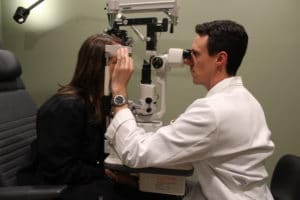
Hattiesburg Eye Clinic’s new glaucoma specialist Dr. Adam Quinn was still unpacking his clinical office after relocating from the University of Alabama at Birmingham (UAB) where he has just completed a glaucoma fellowship. The next day he would be seeing his first patients in South Mississippi.
“Let’s just say it’s going to be a full day,” he said.
His opening patient load illustrates what the statistics tell us: that glaucoma is a leading cause of vision impairment in the United States with the number of new cases increasing annually. The disease is gradually robbing the sight of more than 3 million people in the U.S. today, up to a third of who may not know they have it. But while the damage it causes is irreversible, specialists like Dr. Quinn can help slow the disease progression and help patients manage it more effectively.
The disease is usually related to abnormally high pressure occurring in the intraocular fluid that fills the eye. Normally, excess fluid drains from the eye to help maintain a healthy pressure level. But hereditary or environmental factors, injury, and diseases like diabetes can interfere with the eyes’ ability to drain excess fluid, which can then increase the overall pressure. Over time this high intraocular pressure can damage the optic nerve.
All of this can be happening early on without any symptoms like pain or vision impairment. But the damage is still occurring and at some point the person will begin to notice effects with their vision. And, similar to cataracts, these effects become more noticeable later in life.
Which is why glaucoma cases are now on the rise: as the percentage of the population over 50 continues to increase (thanks to the “Baby Boom” generation entering their senior years), the prevalence of age-related diseases like glaucoma is sky-rocketing. As a result, ophthalmologists across the country are seeing a sharp hike in glaucoma cases with many struggling to manage the swell.
Recognizing the need for advanced glaucoma care in South Mississippi, Hattiesburg Eye Clinic began looking some time ago for a specialist who could diagnose and treat glaucoma patients without the clinic having to refer them to one in Jackson or New Orleans. “Similar to our approach with cataract treatment, we also wanted to provide more advanced care options for our patients struggling with glaucoma,” said Hattiesburg Eye Clinic Ophthalmologist, Dr. Stoney Williamson.
At the same time, Dr. Quinn was looking for a career change that would bring him not only closer to his native Baton Rouge, Louisiana, but also provide him a challenge.
“My dad was a pediatrician for a small town outside Baton Rouge for many years, and the only practicing pediatrician in that community,” he said. “The impact he had on the lives of those families made a profound impression on me. I knew I wanted to practice medicine where there was a real need for what I could offer.”
After earning his undergraduate degree at Louisiana State University in 2009 and subsequently his medical degree in 2013, he went on to complete his internship at Baptist Health System in Birmingham and then his ophthalmology residency and glaucoma fellowship at UAB. A friend told him about Hattiesburg Eye Clinic’s interest in a glaucoma specialist, and he soon connected with the clinic and joined the group in July, 2018.
As a glaucoma specialist, Dr. Quinn performs both traditional and newer innovative procedures that attempt to lower intraocular pressure. These include minimally invasive glaucoma surgeries (MIGs) for patients who are having issues with traditional eye drops, and selective laser trabeculoplasty (SLT). In the latter procedure, the specialist directs a laser beam at the eye’s drainage system in which it’s believed it then stimulates the release of enzymes to the region that subsequently improve drainage.
Dr. Quinn also performs cataract surgeries, which for some patients may help improve their intraocular pressure. “Although the causes for the two conditions are unrelated, cataracts in some glaucoma patients can further block the eye’s drainage system and thus increase intraocular pressure,” says Dr. Quinn. “By performing cataract surgery earlier for these select patients, we may be able to reduce their intraocular pressure.”
Pressure reduction is the name of the game in glaucoma disease management: it’s estimated that for every point lowered in intraocular pressure there’s a 10% decrease in worsening symptoms from the disease. Which is why, according to Dr. Quinn, keeping intraocular pressure under control as early as possible in a patient’s life is a primary goal of his specialty.
“It all begins with detecting elevated pressure during an eye exam,” says Dr. Quinn. “That’s why we encourage everyone, especially those with a family history, to undergo an exam every year beginning by at least age 40. If caught early, we may be able to manage symptoms through medication. If the symptoms worsen, we may then consider other interventions like surgery to improve pressure.”
For patients with glaucoma, managing this disease is a life-time endeavor. But as he begins his practice with Hattiesburg Eye Clinic, Dr. Quinn hopes to make a difference in these patients’ lives, helping them preserve more of their vision for as long as possible.


